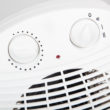Space Heaters: Keep Your Family Safe
February 4, 2022
As winter’s icy blast continues to bear down on us, many of us turn to a space heater for extra warmth. Plug it in and get warm – what could be simpler than that? But beware, because if used improperly, a space heater can mean dangerous, even deadly consequences for you and your family. According to the U.S. Consumer Product Safety Commission, unsafe space heater use results in more than 25,000 fires and more than 300 deaths each year. Tragically, just last month, 17 people died in a Bronx fire caused by a faulty space heater.
It’s not difficult to protect your home and family by following a few simple practices.
Space heater safety begins when you are shopping for a heater. Make sure the purchase you are considering is Underwriters Laboratory (UL) certified. This simple step is too often overlooked. Since 1894 UL has rigorously tested products for safety to protect consumers.
Check to be sure your heater has essential safety features like:
- A Tip-Over Switch which will shut the unit down if it’s not in an upright position.
- An Automatic Shut-off/Overheat Protection to shut down the unit in the case of overheating,
- A Plastic Face to keep the grill from getting so hot that you can burn your skin on it.
Plug it in safely. When you bring your space heater home, plug it directly into a wall outlet, not an extension cord. Electrical experts advise that we should avoid extension cords and power strips when using a space heater because heaters draw a substantial amount of current and can overheat extension cords and start a fire.
Unplug your heater when you leave home. Don’t leave a running space heater unattended, even for a few minutes, and unplug the unit when you are not using it. Fire inspectors say the space heater in the Bronx tragedy had been left on for days. Leaving your space heater running all night long while you sleep is never a good idea. If the unit tips over, short-circuits, or overheats, it could start a fire while you are asleep.
Keep your space heater away from children, pets, water, and at least three feet away anything that could catch fire. Don’t use your space heater as a supplemental dryer, either.
Regularly examine your space heater. Red flags that signal you need a new unit include frayed cords, an overheating unit, or missing parts.
Space heaters can be a convenient and cost-effective way to add some additional heat in your home during these cold winter months, and they can be safely used if you just follow a few common sense guidelines. Stay warm!


